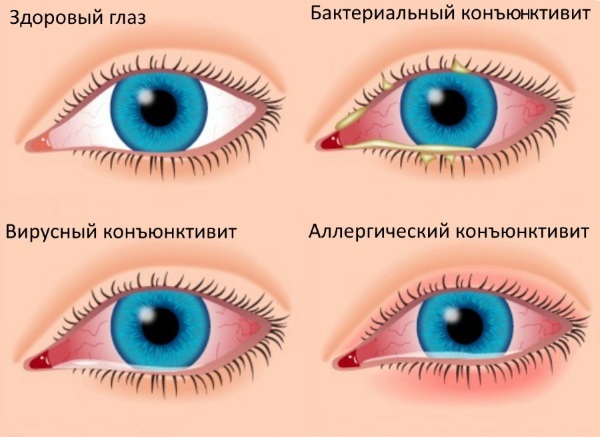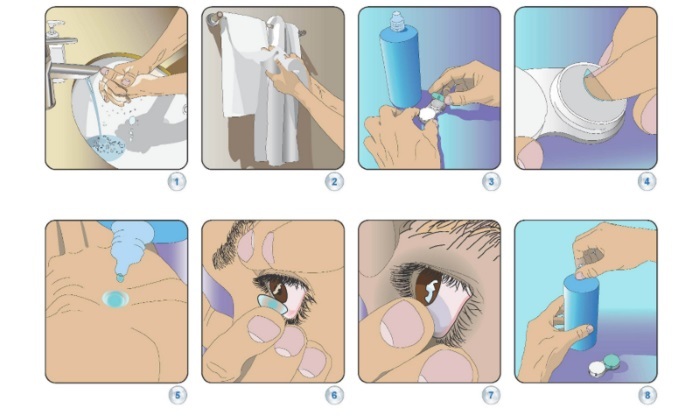
Many who wear contact lenses have heard that sleeping in them is quite harmful.
There may be corneal edema and other unwanted symptoms.
And you, wondered, is it possible to sleep in the lenses during the day, an hour or two?
Or is sleep in them undesirable at any time of the day? Much depends on the type of lenses that are used by man.
In this article, we will look in detail at the questions posed above.
- 1. Can I sleep in lenses?
- 2. What should necessarily remove
- 3. Consequences of sleep in
- lenses 4. We treat problems with eyes
- 5. Conclusion
Can I sleep in lenses?

It is necessary to see the conditions of use of your lenses. This is described on their packaging. Sleep is recommended only in those lenses that are designed for prolonged wearing.
After all, they can be worn for a couple of days without ever taking off. But do not forget that contact lenses are an extraneous object before your eyes. Therefore, from a long sleep try to refuse or at least do it as rarely as possible.
This is rather cumulative because the eyes do not get enough oxygen and dry. Nothing terrible will happen, if in the afternoon you decide to sleep an hour or two. The maximum that can happen - you will become more difficult to blink, because during sleep, the eyeball is not so well moisturized.
In order to protect yourself as much as possible from the complications that a lens can cause, you need to know the rules for using them:
- You need to choose the right contact lenses. After all, lenses designed for long-term wearing can be purchased for different periods. It can be a day, a week, or a month or six months.
- Never allow foreign objects to enter your lens, otherwise your eyes may be damaged. Do everything strictly according to the instructions.
- Do not damage the lens, gently pull it out to put on.
- Make sure that the lens has good gas conductivity. Watch for the expiration date of the lenses and keep your hands clean before using the lenses. With eye pains, refrain from wearing them.
What you need to shoot
Strongly it is not recommended to sleep in one-day lenses. Even if you really want to take a nap for about 15 minutes, you need to remove the lenses. As soon as you close your eyes, the corneal edema begins.
The longer you sleep in one-day lenses, the stronger your eyes swell. A sleep of 1-2 hours is possible only in silicone hydrogel lenses. But with the condition that your eyes are in good health and healthy. Otherwise, there is a chance of getting an infection.
Go to the oculist and find out if you can sleep at all in the lenses and if so, in which ones. The specialist will choose lenses based on the characteristics of your eyes. Only do not experiment at all.
Lenses that do not allow oxygen, that is, conventional, also do not leave for the night. During sleep, oxygen does not flow to the surface of the eyes and pain is possible. After all, the supply of oxygen and moisturizing the eye is possible only with blinking. During sleep this does not happen.
Consequences of sleep in
lenses The effects of sleep in non-intended lenses can be of varying severity. After all, each lens and each eye has its own characteristics and specificity.
Corneal edema
While you sleep your eyes are in the same position. They are closed for centuries and the air does not moisturize your cornea. Your eyes can blush.
If you look at the lamp, then around it formed a semblance of a rainbow. All objects around are blurred.
Congestion of protein
The most common manifestation of wearing lenses and sleep in them. Due to eye contact with the lens, a rough matte film appears on it. It is difficult to detect it, except that the surface of the lens becomes more oily.
These deposits accumulate and over time your eyes may begin to itch and blush. If this happens, then give up sleep in the lenses and change them to one-day.
In case of frequent manifestations of protein deposits, change the material from which the lenses are made. These deposits can cause diseases of the cornea of the eyes and cause inflammation. A rough, greasy surface can damage your eyes.
Conjunctivitis
Possible with frequent replacement of lenses or allergic reaction to the solution. Symptoms of conjunctivitis: discharge from the eye, itching, feeling that there is an object in the eye.
If you have this disease, then either wear out the lenses less often, or abandon them permanently. Take medications that will rid your eyes of mast cells. Drops will help to remove irritation.
On the next image you can see how different kinds of conjunctivitis affect the eye:

Problem with
vessels They grow on the cornea. This is possible if you sleep in soft lenses. They do not miss oxygen in principle. This can lead to poor eyesight.
Acanthamoeic Keratitis

Rare, but one of the most dangerous diseases for the eyes. Acanthamoe, which appears on the surface of the lens causes severe irritation.
If you sleep in lenses and do not follow their condition, keratitis can have extremely negative consequences.
Corneal ulcer
It can be both infectious and sterile. If the form is contagious, the pain is very strong, pus is released in large quantities.
It is necessary to take a course of antibiotics. Sterile form is less dangerous, it proceeds gently and pain syndromes do not appear.
Allergy
The more often you go in lenses, the higher the chance of an allergic reaction. It can be both the material of the lens itself and the solution in which you store your lenses.
And the allergy often turns into conjunctivitis. If you are allergic to the solution, doctors advise you to replace it with a solution without preservatives. When reacting to the lens itself, it is simply necessary to replace the material.
Treating eye problems with
If you are experiencing the above eye problems that have arisen, due to the wearing of lenses, you need to gently correct them. There are a lot of methods to combat such ailments. To begin with, try changing lenses to others, from another material. Many of them do not miss moisture and oxygen, and some will not suit you because of your features.
Try to clean the lenses in time and do not wear them longer than the specified time. For the most common person, a day regimen is recommended. This means that sleep in lenses should be abandoned, it is better not to take risks.
Choose contact lenses exclusively with the help of a specialist. This will simplify your life and help prevent harmful consequences. In microbial infections, it is often necessary to take a course of antibiotics.
Also understand that it is impossible to wash the lenses with tap water, because there are various impurities in it that can settle on the surface of the lens.
The prevalent number of diseases comes from the fact that a person does not consult a doctor in a timely manner. If you have the same or similar symptoms, then postpone the visit to the ophthalmologist.
In general, so that there are fewer problems with your eyes and time, many advise buying long-wearing lenses.
There are also special lenses in which, as the manufacturers say, you can sleep. But they are much more expensive and these costs are not always justified.
After all the manifestation of all of the above symptoms is possible when using any contact lenses. Over time, they are all contaminated, deteriorating and their life time is coming to an end.
A very important detail, even if you hardly wear lenses, for example, only a couple of times, and their service life is 1 month, then in any case they will have to be thrown out in a month.
The material deteriorates with time, its properties deteriorate. The ability of oxygen and moisture to penetrate the cornea is reduced, which entails the symptoms described above.
Conclusion
If you do not want to remove the lens during sleep, then you should remember the safety rules. Do not forget about the care of the lenses. Also it is worth remembering the consequences of both day and night sleep in contact lenses.
Be sure to visit your doctor to determine your type of lens. The rule of hygiene in many ways determines the chances of picking up a disease.
How promising would not be the description of lenses from different companies, you still need to adhere to the general rules for their use. Remove the lens at least once in 2 days, and preferably at least once a day.
Their constant wearing leads to the fact that the eyes get used to the presence of a foreign body in them. Their material is dense, so your eyelids do not completely close. This increases the risk of infection in the cornea.
If after sleep in the lenses your eyes are still affected, then drip in them a large number of moisturizing drops. You do not need to remove the lens without first moistening your eyes. Because your cornea is so badly damaged.
In addition to the above, it is necessary to comply with the rules for the handling of lenses. They are depicted in the following picture:

Compliance with these rules will help you to keep your eyes healthy and significantly reduce the risk of various ailments.
